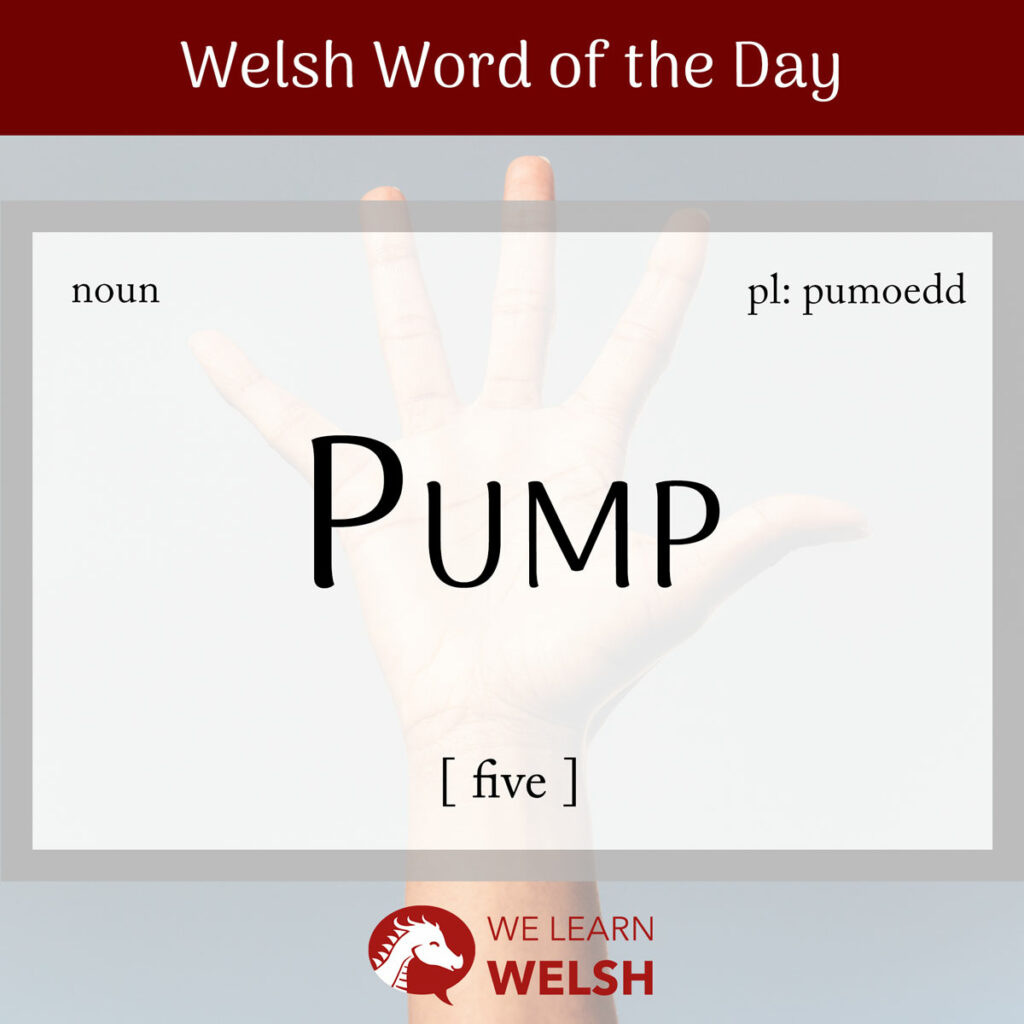When learning a new language, the numbers one to ten are definitely some of the most useful words to have in your arsenal! Today we’re going to talk about the Welsh number pump, which means five.
pump
five
In old Welsh writings, this word was more likely to appear as pymp or pimp, but pump is the universal spelling today. It has cousins in the Breton word pemp and the Cornish pymp. Most likely, all these words originally come from a proto-Indo-European root word, *penke, which is also a distant ancestor of English five and would have originally referred to the five fingers of a fist.
The fact that bysedd (fingers) come in pumoedd (fives) is almost certainly why the number has often been so important to humans, and shapes the way it appears in language, too. For example, consider the following colloquial Welsh phrases:
- rho dy bump imi = give me five
- estyn [ei] bump = to extend [his] hand
- brechdan pump = a fist to the face (literally a five sandwich)
- rhoi pump ar = to steal
- ymarfer pumbys = five-fingered exercise (on the piano)
The word pumbys (five-fingers) was often used to mean hand in old-fashioned literary Welsh, and still shows up in the names of some kinds of plants and flowers, like pumbys yr Alban (cinquefoil, literally Scotland’s hand) and pumbys Mair (globe-flower, literally Mary’s hand).
Although pump is the standard word for five, there are two ways in which it undergoes changes in everyday speech. The first, of course, is that it can mutate, a property it shares with many other Welsh words.
Soft mutation
bump
Nasal mutation
mhump
Aspirate mutation
phump
The other kind of change is a bit more unique. What’s quite interesting about pump is that when we put it directly in front of a noun to count that noun, it loses its final letter and becomes pum. So, five cats is pum cath, not pump cath.
This change has most likely just evolved over time to make speech flow a bit more smoothly, since p is such a harsh, plosive sound. The same thing happens to the numbers cant (hundred) and chwech (six), which become can and chwe respectively.
There’s one exception to this rule, which is the expression pump oed (five years of age).
You might also have noticed that I used the singular cath (cat) in the phrase pum cath, rather than cathod (cats). If you haven’t come across this before, this is just a regular feature of counting in Welsh. When we are counting, we generally use the singular form of a noun, not the plural.
If we do want to use the plural form, we can, but there’s an extra step to it. We have to insert the preposition o (of) in between the number and the noun, which also causes a soft mutation. And in this case, the numbers pump, chwech and cant all remain in their original form and don’t lose the final letter.
So five cats can be either pum cath or pump o gathod. Although I would say the latter perhaps sounds slightly more formal, either option is completely fine, sounding normal and natural in either formal or informal speech.
Mae gen i bump o ferched.
I have five daughters.

Pump, or forms of it, also appear in the words for many larger numbers. In many cases there are two options. This is because there are two counting systems in Welsh – the traditional system, which is based on counting in twenties, and a more modern system which evolved in the Welsh colony of Patagonia, which is based on counting in tens. (This also means that it’s much easier for English speakers to learn).
There are some examples of the differences in the table below.
| ENGLISH | TRADITIONAL SYSTEM | PATAGONIAN SYSTEM |
| fifteen | pymtheg | un deg pump |
| sixteen | un ar bymtheg | un deg chwech |
| twenty-five | pump ar hugain | dau ddeg pump |
| thirty–five | pymtheg ar hugain | tri deg pump |
| fifty | hanner cant | pum deg |
| five hundred | pumcant / pum cant | pumcant / pum cant |
| five thousand | pum mil | pum mil |
Which counting system a Welsh speaker prefers will depend on their dialect and age, so as a learner, it’s best to get familiar with both. Although almost everyone you speak to will understand either system, you also want to make sure you can understand everyone who speaks to you!
Yn y flwyddyn pymtheg cant, Harri’r seithfed oedd yn frenin.
In the year fifteen hundred, Henry VII was king.
The word for fifth is pumed. This can function as a noun, if you’re referring to the fraction or to the musical interval, or more commonly and simply as an ordinal. In this case it’s sometimes abbreviated to 5ed, for example, if you’re writing a date.
Pumed causes soft mutations to feminine nouns that follow it, and in this case it also mutates itself to bumed after y (the). This doesn’t happen when it’s being used with masculine nouns. So the fifth girl is y bumed ferch, but the fifth boy is y pumed bachgen.
Pump itself doesn’t actually automatically cause a mutation to the word following it (although many Welsh numbers do). Historically, it caused a nasal mutation to various other words, especially in compound words.
In very specific cases, it still does so today – when it is followed by blynedd, blwydd or diwrnod. So, respectively, these would become pum mlynedd (five years), pum mlwydd (five years), or pum niwrnod (five days). In the last case, the mutation is often dropped colloquially and people just say pum diwrnod instead. But the first two are generally respected in both formal and informal speech.
Mae plant yn dysgu ysgrifennu pan maen nhw’n tua phum mlwydd oed.
Children learn to write when they are about five years old.
Let’s finish up with some miscellaneous pumol (quinary) terminology:
- fesul pump = in fives
- pumwaith = five times
- y tabl pump = the five times table
- pumochr / pentagon = pentagon
- pumongl / pentagram = pentagram
- pumsill = five syllable
- pum seren = five stars
- cymryd pum munud = taking five
- papur pumpunt = a fiver


